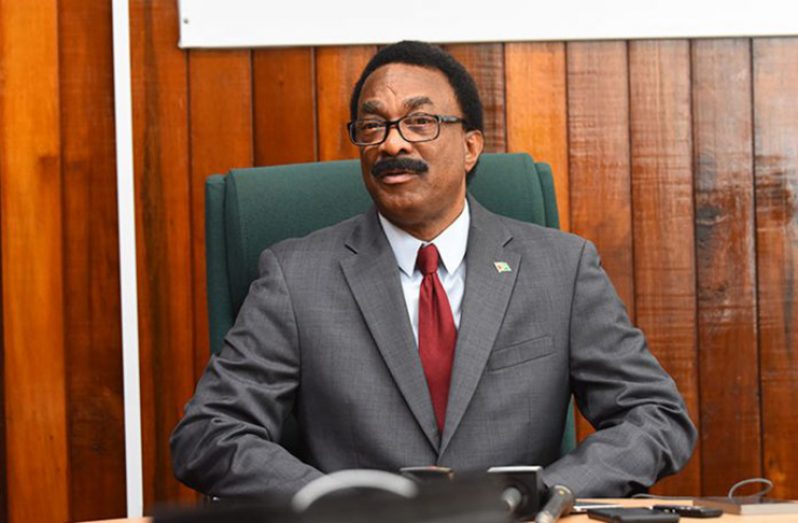…AG raps Bar Association for misleading statements on timeframe for reopening of Parliament
….questions body’s impartiality, motive
ATTORNEY General and Minister of Legal Affairs, Basil Williams, said Article 69 of the Constitution is directory and not mandatory as established by the Court of Appeal in 2006, as he dismissed contentions by the Bar Council of the Guyana Bar Association that Guyana will delve into ‘Constitutional abyss’ should there be no Parliament in place by April 30.
In a statement recently, the Bar Council, in urging the Guyana Elections Commission (GECOM) to make haste in the execution of the National Recount, said the Constitution mandates that Parliament be convened no later than four months after its dissolution.
“Article 69 of the Constitution of Guyana mandates that, on dissolution, the next session of Parliament must commence no later than four months from the end of the preceding session. The last session of Parliament was dissolved on December 30, 2019. The next session of Parliament must therefore begin no later than April 30, 2020,” the council said.
Warning that the Constitutional clock is ticking, it urged the Elections Commission to declare the results of the 2020 Elections within the “shortest possible time” so that the next session of Parliament can commence as constitutionally prescribed, that is, no later than April 30, 2020.
But the Attorney General said the Bar Council has presented nothing but “half-truth” to the people of Guyana, as he brushed aside contentions that the country will fall into a Constitutional abyss, if GECOM’s attempts, under Article 162 (1)(b) of the Constitution, to deliver an impartial and free election, in compliance with the laws of Guyana, take it beyond April 30,2020.
“The Bar Council had a duty to fully disclose that though Article 69 of the Constitution provides that on dissolution the next session of Parliament must be convened no later than four months from the end of the preceding session, the Court of Appeal of Guyana, in 2006, upheld the decision of the then Chief Justice, Carl Singh, that the four-month timeline was directory and not mandatory,” Williams said on Saturday.
The case – Civil Appeal No.79 of 2006 – was appealed by the Leadership of the Alliance For Change (AFC), challenging the People’s Progressive Party/Civic’s (PPP/C’s) convening the new Parliament, not on September 2, 2006 – four months after dissolution – but on September 28, 2006 almost five months later. The Attorney General said back then the Bar Council, made no issue about a constitutional abyss.
The Civil Appeal was birthed out of a decision by the then elected President, Bharrat Jagdeo, to convene Parliament weeks after the constitutional timeline. The AFC had argued that the 9th Parliament should have been convened by September 2, 2006, on the grounds that the 8th Parliament was dissolved on May 2, 2006 to pave way for General and Regional Elections in August that year. Instead of September 2, Jagdeo had indicated that the 9th Parliament would have been convened on September 28. The court then ruled that Article 69 was directory and not mandatory.
“In the 2006 elections there was no pandemic that required social distancing, nor court challenge before the declaration of the results of the elections as at present and the evidence showed a deliberate intention on the part of the PPPC to ignore the four months’ timeline in Article 69,” the Attorney General reasoned.
He added: “Jagdeo had thrown the kitchen sink at Article 69 at the 2006 elections.”
The Attorney General also pointed to the fact that Jagdeo was sworn in as President on September 2, 2006 the date on which Parliament should have been convened. The then President had also appointed his ministers even before their names were extracted by the Representative of the PPPC’s list, and before the first session of Parliament commenced.
“Despite this blatant noncompliance with Article 69 by these actions coming after the four months required therein, the Court held that they were valid and Constitutional,” Williams said.
The Attorney General expressed the hope that GECOM’s lawyers would respond to the “vituperation and abuse” directed towards the Elections Commission and its Secretariat by the Bar Council. Nonetheless, he urged GECOM not to be distracted from its constitutional mandate envisaged in Articles 62 and 162 of the Constitution to independently supervise and conduct elections in Guyana, in order to deliver credible elections.
The Attorney General made it pellucid that Guyana would not, in 2020, descend into any constitutional abyss were GECOM, in all the prevailing circumstances, in the pursuit of democracy, is unable to meet the April 30, 2020 timeline.



.jpg)











